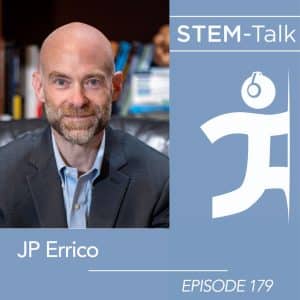STEM-Talk: JP Errico on vagus-nerve stimulation, inflammation and chronic disease management
Published 3.5.25
STEM-Talk episode 179, featuring JP Errico, the author of “The Vagus Immune Connection: Harness Your Vagus Nerve to Manage Stress, Prevent Immune Dysregulation and Avoid Chronic Disease,” is now available.
Errico is known for his innovative work in neuroimmunology, the study of how the nervous system and immune system interact, with a focus on transcutaneous vagus nerve stimulation. He recently joined IHMC as a Senior Research Scientist.
An early breakthrough in his career came in work studying the link between vagus-nerve stimulation and asthma. He says that patients admitted to the hospital for asthma — which numbers in the hundreds of thousands annually — spend more time in the hospital than patients who undergo a full spinal fusion surgery.
Errico and his colleagues tried stimulating the vagus nerve during asthma attacks on patients who were not responding to other treatments.
“They’d be hunched over, struggling to breathe and all of the sudden, at one point, they would suddenly just sit back and be able to breathe normally. And they would look at you with wide eyes and say, ‘What did you do?!’
They stimulated the vagus nerve.
Errico is an accomplished scientist, executive, entrepreneur, and inventor. He is the founder of ElectroCore, a prominent company specializing in neuromodulation that has developed a pioneering noninvasive vagus nerve stimulator.
On STEM-Talk, he shares that journey with IHMC’s Founder Dr. Ken Ford and co-host Dr. Tim Broderick, IHMC’s Chief Science officer.
Neuroimmunology affects a wide range of health factors including inflammation, mental health and aging. Errico believes everyone should understand neuroimmunology to live a healthy life.
“I’ve come to realize that stimulating the nervous system the right way also activates multiple other systems in the body,” Errico says. “One is your immune system. The other is your cellular metabolism. It also has a pretty profound effect on your microbiome. When I think of the four most fundamental pillars on which all life functions, it’s your immune system, it’s your cellular metabolism it’s your microbiome and it’s your autonomic nervous system.”
He earned an undergraduate degree in aeronautical engineering from MIT and worked at the U.S. Air Force’s national laboratory, Lincoln Laboratories. He also holds graduate degrees in both law and mechanical/materials engineering from Duke University.
The conversation covers a lot of ground including:
- The influence on his life and career of teachers in his high school life that encouraged this math whiz to squeeze in years of advanced level math instruction at a young age.
- The inspiration he found in Robert Jastrow’s “Red Giants and White Dwarfs,” a book he has shared now with his own daughter, and “Black Holes, White Dwarfs, and Neutron Stars” by Saul Teukolsky and Stuart Shapiro.
- How his uncle’s frustrating experience with the design of medical devices fueled his interest in that field.
- What he views as the confluence of law, science, and math. “The law is supposed to be about the truth, but at the end of the day, there is only one truth and that truth is math. Science is a story that we tell to try and explain what we observe, and that story evolves over time. It’s always imperfect, but math is perfect. Math is the truth.”
- How the search for maximizing the efficacy of non-invasive vagus nerve stimulation led to gammaCore and Truvaga, devices his company has designed.
- The role that the vagus nerve plays in the treatment of pain, phantom pain, depression, ketone expression, improving learning.
- Errico’s book, “The Vagus Immune Connection: Harness Your Vagus Nerve to Manage Stress, Prevent Immune Dysregulation and Avoid Chronic Disease,” and much, much more.
Listen to our conversation with Errico, and browse the full STEM-Talk library, wherever you enjoy podcasts.
IHMC is a not-for-profit research institute of the Florida University System where researchers pioneer science and technology aimed at leveraging and extending human capabilities. IHMC researchers and staff collaborate extensively with the government, industry and academia to help develop breakthrough technologies. IHMC research partners have included: DARPA, the National Science Foundation, NASA, Army, Navy, Air Force, National Institutes of Health, IBM, Microsoft, Honda, Boeing, Lockheed, and many others.
Latest News
- STEM-Talk: Pascal Lee on returning to the Moon — and heading to Mars
- Aging Symposium draws experts to IHMC
- IHMC hosts Fredric G. Levin Lung Care Symposium March 27-28 in Pensacola
- Humanoid robotics and exoskeletons lead latest IHMC newsletter
- Celebrate Robotics Week at IHMC Open House on April 11, 2025
- Registration open for 2025 Summer Robotics Camp
- STEM-Talk: JP Errico on vagus-nerve stimulation, inflammation and chronic disease management
- STEM-Talk: Karl Herrup on shortcomings of Alzheimer’s research
- Pensacola attorney joins IHMC Board of Directors


